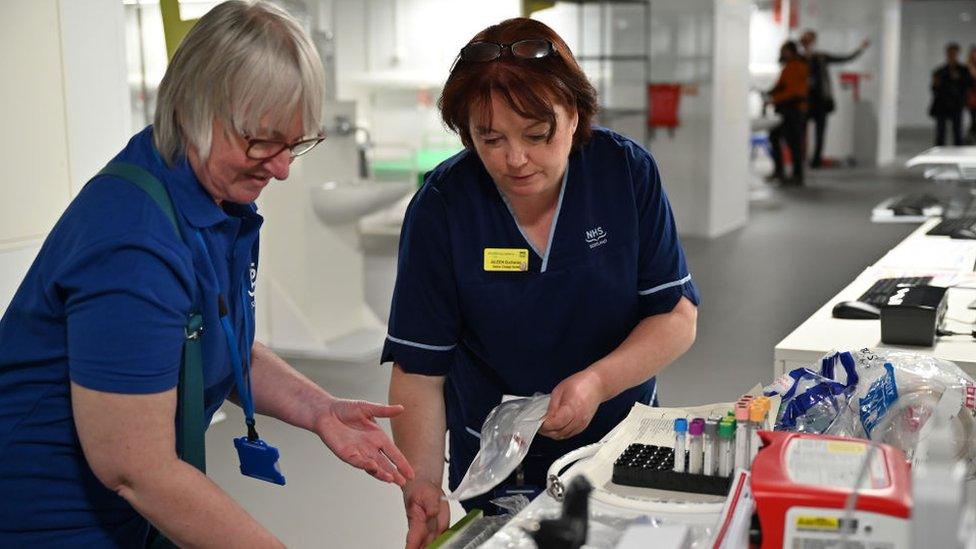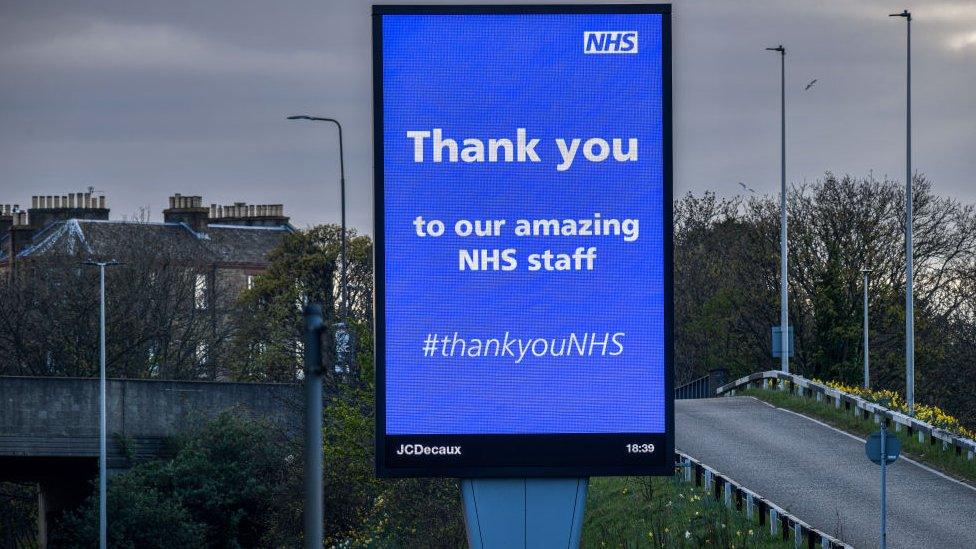Coronavirus in Scotland: Sturgeon 'cautiously optimistic' that NHS can cope
- Published

Scotland's first minister has said she is "cautiously optimistic" that the country's NHS will be able to cope with the coronavirus pandemic.
Nicola Sturgeon said the number of people being admitted to hospital with the virus had stabilised.
There has also been a slight reduction in the number of patients requiring intensive care treatment.
Ms Sturgeon said she hoped the number of people dying would start to fall in the next couple of weeks.
But she told her daily briefing that a further 70 people with confirmed cases of coronavirus had died since yesterday - bringing the total number of deaths in Scotland under that measurement to 985.
The actual number of deaths will be higher once those suspected to have had the virus are taken into account.
Ms Sturgeon also said that:
Police now have the power to enforce social distancing rules in workplaces, but she stressed this would largely be done through "encouragement and dialogue" rather than through officers "routinely patrolling office blocks"
It would be "wrong and potentially dangerous" to lift lockdown for economic reasons alone, as coming out too soon and having to reimpose the measures after a resurgence in the virus would potentially cause even greater economic damage
The only consideration on when the lockdown should be lifted will be "what is best for Scotland", which could mean either a UK-wide easing or Scotland taking its own approach
The Scottish government has not yet taken a definite decision that schools will not reopen until after the summer.
The first minister said the number of positive cases of coronavirus in Scotland had increased by 222 to 8,672 over the past 24 hours.
But the number of people in hospital had increased by just 57, to a total of 1,866, while the number of patients in intensive care units had fallen by three to 166.
The first minister said that, while she would "urge caution" in interpreting these figures, she remains "cautiously optimistic".

Ms Sturgeon added: "While the numbers being admitted to hospital are still fluctuating on a daily basis, they do appear to be broadly stable, and secondly the numbers being admitted to intensive care are at this stage reducing.
"It is not too long ago that we were seriously worried about the potential for our hospital capacity to be overwhelmed by now.
"The fact that it is not is down to at the planning that has been done in the National Health Service, of course, but more than that it is down to the high compliance with the lockdown restrictions.
"So my thanks to all of you for helping us to ensure that the NHS has been able to cope, although the work that they do is very difficult and very challenging."
Ms Sturgeon went on to say that the nature of the virus meant there would be a "lag" between the numbers being admitted to hospital and intensive care reducing, and a fall in the number of deaths.
But she added: "I hope we will see the latter number also start to reduce in the next couple of weeks."


I spent the morning at a practice in Penicuik in Midlothian. The waiting room was deserted and only a tiny fraction of patients are now coming to the surgery, with most having a consultation by phone or video call. Behind the scenes receptionists are busy managing calls, with the team taking between 400 and 500 every day.
Any patients who need to come to the practice are met by a doctor or nurse in protective clothing. Those with suspected Covid -19 are directed to coronavirus assessment centres. Just like in hospitals it's important to make every effort to minimise the risk of infection for both patients and staff.
Routine blood tests are carried out in the car park, a make shift gazebo covers a drive-in space where the patient rolls down their window and stretches out their arm. House calls do still happen, the staff tell me, because they need to check in on their most vulnerable patients. But after a chap at the door to say the doctor has arrived, the visor, gloves, mask and apron are all donned.
Doctors say they are worried that some people are ignoring symptoms for too long. They want people to know that behind the closed front door, they are very much open for business.
The role of the GP has always been to manage a patient's care in the community, to keep them out of hospital unless they need to be there. More than ever that is a vital service to ensure our hospitals don't become overwhelmed.